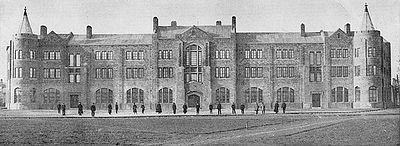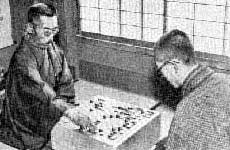|
Tan Xiao
Tan Xiao (; born 10 March 1993) is a Chinese professional Go player. He won the 11th RICOH Cup. In 2017, he defeated Park Yeong-hun to win the 11th Chunlan Cup The Chunlan Cup, officially the Chunlan Cup World Professional Weiqi Championship (), is an international Go competition. Outline The Chunlan Cup is an international Go tournament sponsored and hosted by the Chunlan Group of China. 24 players a ..., his first international individual title and was promoted to 9 dan. Personal life Tan married Jia Ganglu, who is also a professional Go player, in November 2017. Promotion record Career record *2007: 35 wins, 14 losses *2009: 33 wins, 12 losses *2010: 31 wins, 21 losses *2011: 23 wins, 9 losses Titles and runners-up References 1993 births Living people Chinese Go players Sportspeople from Changchun 21st-century Chinese people {{PRChina-Go-bio-stub ... [...More Info...] [...Related Items...] OR: [Wikipedia] [Google] [Baidu] |
Changchun
Changchun (, ; ), also romanized as Ch'angch'un, is the capital and largest city of Jilin Province, People's Republic of China. Lying in the center of the Songliao Plain, Changchun is administered as a , comprising 7 districts, 1 county and 3 county-level cities. According to the 2020 census of China, Changchun had a total population of 9,066,906 under its jurisdiction. The city's metro area, comprising 5 districts and 1 development area, had a population of 5,019,477 in 2020, as the Shuangyang and Jiutai districts are not urbanized yet. It is one of the biggest cities in Northeast China, along with Shenyang, Dalian and Harbin. The name of the city means "long spring" in Chinese. Between 1932 and 1945, Changchun was renamed Xinjing () or Hsinking by the Kwantung Army as it became the capital of the Imperial Japanese puppet state of Manchukuo, occupying modern Northeast China. After the foundation of the People's Republic of China in 1949, Changchun was established as the provi ... [...More Info...] [...Related Items...] OR: [Wikipedia] [Google] [Baidu] |
Jilin
Jilin (; alternately romanized as Kirin or Chilin) is one of the three provinces of Northeast China. Its capital and largest city is Changchun. Jilin borders North Korea (Rasŏn, North Hamgyong, Ryanggang and Chagang) and Russia (Primorsky Krai) to the east, Heilongjiang to the north, Liaoning to the south, and Inner Mongolia to the west. Along with the rest of Northeast China, Jilin underwent an early period of industrialization. However, Jilin's economy, characterized by heavy industry, has been facing economic difficulties with privatization. This prompted the central government to undertake a campaign called "Revitalize the Northeast". The region contains large deposits of oil shale. Name The name "Jilin" originates from ''girin ula'' () , a Manchu phrase meaning "along the river", shortened to Kirin in English. This Manchu term was transcribed into ''jilin wula'' ( t , s ) in Chinese characters and shortened the first two characters, which are tran ... [...More Info...] [...Related Items...] OR: [Wikipedia] [Google] [Baidu] |
China
China, officially the People's Republic of China (PRC), is a country in East Asia. It is the world's most populous country, with a population exceeding 1.4 billion, slightly ahead of India. China spans the equivalent of five time zones and borders fourteen countries by land, the most of any country in the world, tied with Russia. Covering an area of approximately , it is the world's third largest country by total land area. The country consists of 22 provinces, five autonomous regions, four municipalities, and two Special Administrative Regions (Hong Kong and Macau). The national capital is Beijing, and the most populous city and financial center is Shanghai. Modern Chinese trace their origins to a cradle of civilization in the fertile basin of the Yellow River in the North China Plain. The semi-legendary Xia dynasty in the 21st century BCE and the well-attested Shang and Zhou dynasties developed a bureaucratic political system to serve hereditary monarchies, or dyna ... [...More Info...] [...Related Items...] OR: [Wikipedia] [Google] [Baidu] |
Chinese Weiqi Association
{{China-org-stub ...
Chinese Weiqi Association (), or Chinese Go Association, founded in Hefei, Anhui in 1962, is the major go organization in China. As a branch of the Zhongguo Qiyuan, it oversees professional players as well as strong amateurs, functioning in the same way as the Nihon Kiin and other such groups. Chinese Weiqi Association became a member of the International Go Federation in 1982. List of chairmen * Li Menghua (李梦华): 1962–1988 *Chen Zude (陈祖德): 1988–2006 * Wang Runan (王汝南): 2006–2017 * Lin Jianchao (林建超): 29 December 2017–present References Go organizations Sports organizations established in 1962 Weiqi Go is an abstract strategy board game for two players in which the aim is to surround more territory than the opponent. The game was invented in China more than 2,500 years ago and is believed to be the oldest board game continuously played to ... [...More Info...] [...Related Items...] OR: [Wikipedia] [Google] [Baidu] |
Go (board Game)
Go is an abstract strategy board game for two players in which the aim is to surround more territory than the opponent. The game was invented in China more than 2,500 years ago and is believed to be the oldest board game continuously played to the present day. A 2016 survey by the International Go Federation's 75 member nations found that there are over 46 million people worldwide who know how to play Go and over 20 million current players, the majority of whom live in East Asia. The playing pieces are called stones. One player uses the white stones and the other, black. The players take turns placing the stones on the vacant intersections (''points'') of a board. Once placed on the board, stones may not be moved, but stones are removed from the board if the stone (or group of stones) is surrounded by opposing stones on all orthogonally adjacent points, in which case the stone or group is ''captured''. The game proceeds until neither player wishes to make another move. When ... [...More Info...] [...Related Items...] OR: [Wikipedia] [Google] [Baidu] |
Go Players
This article gives an overview of well-known professional and amateur players of the board game Go throughout the ages. The page has been divided into sections based on the era in which the Go players played and the country in which they played. As this was not necessarily their country of birth, a flag of that country precedes every player's name. For a complete list of player articles, see :Go players. The important dates that this separation is based on are: * The establishment of the Four go houses at the start of the Tokugawa Shogunate. * The demise of the houses in the Meiji Period (end 19th century) followed by their replacement by the Nihon Kiin in 1924. * The start of international tournament Go in 1989 A Japanese census on Go players performed in 2002 estimates that over 24 million people worldwide play Go, most of whom live in Asia. Most of the players listed on this article are professionals, though some top level amateurs have been included. Players famous for ... [...More Info...] [...Related Items...] OR: [Wikipedia] [Google] [Baidu] |
Park Yeong-hun
Park Yeong-hun ( ko, 박영훈, born April 1, 1985), also known as Park Young-hoon and Pak Yeong-hoon, is a South Korean professional Go player. Biography Park Yeong-hun was born in Seoul. He is a professional Go player in the Hanguk Kiwon. He is the youngest ever Korean 9 dan, promoted when he was only 19 years old. Due to the new rules set by the Hanguk Kiwon, Park moved up from 1 dan to 9 in only 4 years 7 months, which is the fastest progress ever. Much of this was due to him winning the Fujitsu Cup in 2004, when he was at 4 dan. This also earned him exemption from military service. His hobbies include tennis and playing Tetris ''Tetris'' (russian: link=no, Тетрис) is a puzzle video game created by Soviet software engineer Alexey Pajitnov in 1984. It has been published by several companies for multiple platforms, most prominently during a dispute over the approp .... Titles and runners-up He ranks #8 in total number of titles in Korea. References * GoGod En ... [...More Info...] [...Related Items...] OR: [Wikipedia] [Google] [Baidu] |
Chunlan Cup
The Chunlan Cup, officially the Chunlan Cup World Professional Weiqi Championship (), is an international Go competition. Outline The Chunlan Cup is an international Go tournament sponsored and hosted by the Chunlan Group of China. 24 players are chosen as follows: *3 top players of last tournament *8 from *5 from *4 from *2 from *1 from North America *1 from Europe The 24 players are reduced to 16 after the first round. The top 8 players are qualified for the next round while the bottom 8 play each other in a knockout tournament. Each player has 2 hours and 30 minutes of time with five 60-second byoyomi A time control is a mechanism in the tournament play of almost all two-player board games so that each round of the match can finish in a timely way and the tournament can proceed. Time controls are typically enforced by means of a game clock, ... periods, since the 12th cup. (Formerly, the time limit was 3 hours with five 60-second byoyomi periods.) The komi is 7.5 p ... [...More Info...] [...Related Items...] OR: [Wikipedia] [Google] [Baidu] |
Mingren
The Mingren () is a Go competition in China organized by the Chinese Weiqi Association. The word ''míngrén'' means "brilliant man". The Mingren is equivalent to the Nihon-Kiin's Meijin and the Hanguk Kiwon's Myungin titles. Outline The Mingren is sponsored by the Zhongguo Qiyuan and the '' People's Daily''. It consists of a preliminary tournament in which 32 players compete against one another to determine the challenger to the previous year's winner. The preliminary is a single-elimination format, and the title match is decided in a best-of-three. Prior to 2016, the final of the preliminary tournament was decided in a best-of-three, and the title match was decided in a best-of-five. The winner's purse is ¥300,000 ($46,834) and ¥80,000 ($12,486) for the runner-up, as of 2017. Past Winners and Runners-up See also *Meijin is one of the eight titles in Japanese professional shogi, and is the most prestigious title, along with Ryūō. The word ''meijin'' (名 ''mei'' "e ... [...More Info...] [...Related Items...] OR: [Wikipedia] [Google] [Baidu] |
RICOH Cup
The Liguang Cup (), or Ricoh Cup, was a Chinese Go competition. It was held 15 times from 2000 to 2015. Outline This tournament was sponsored by "Ricoh is a Japanese Multinational corporation, multinational imaging and electronics company (law), company. It was founded by the now-defunct commercial division of the Riken, Institute of Physical and Chemical Research (Riken) known as the ''Riken ... Hong Kong Limited". The first year featured eight invited participants. The next year it was increased to 16 and then 54 in the third term. The 2011 game featured 48 players. The prize money was 80,000 ($12,300). Past winners and runners-up References {{Chinese go titles Go competitions in China ... [...More Info...] [...Related Items...] OR: [Wikipedia] [Google] [Baidu] |
Qiwang (competition)
The Weifu Fangkai Cup (), also sometimes known as the Qiwang (not to be confused with the defunct Qiwang), is a Go competition This is a list of professional Go tournaments, for competitors in the board game of ''Go''. The tradition, initiated by the Honinbo Tournament in Japan, is for an event to be run annually, leading up to a title match and the award of a title f ... in China. Outline The tournament is sponsored by the Wuxi people government. The tournament began in 2003. Past winners and runners-up References Go competitions in China {{Go-stub ... [...More Info...] [...Related Items...] OR: [Wikipedia] [Google] [Baidu] |



